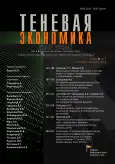Том 6, № 4 (2022)
Articles
Interrelation of the shadow economy and the small and medium-sized businesses in modern conditions
Аннотация
The article focuses on the review of shadow economy in Russia and economic situation in the small and medium-sized entrepreneurship (SME). The development of the SME sector is one of the highest priorities in strengthening the national economy. The shadow economy in the SME sector has a dual nature. On the one hand, small and medium-sized businesses solve their financial problems with the help of shadow operations, which allows enterprises to continue functioning in conditions of economic instability or insufficient state support. On the other hand, the income from shadow activities is not accounted for, destabilizing the economic security of the state, which negatively affects the SME sector itself. The article analyzes small and medium-sized businesses in Russia, assessing the level of shadow economic activity among small and medium-sized businesses. A conclusion about the effectiveness of state support measures is made.
Shadow Economy. 2022;6(4):167-180
 167-180
167-180


Signs of the hidden shadow sector in the context of small business activity in the Trans-Baikal Territory
Аннотация
The analysis of the effectiveness of small business in the Trans-Baikal Territory in the context of individual activities based on statistical data for the period from 2017 to 2021 was conducted. In order to group the types of small business activities according to development efficiency, the calculation of the advance coefficients was made. The ratio of labour productivity growth rates and average wages were taken into account. The types of activities that have positive, satisfactory and unsatisfactory dynamics of development are identified. Possible manifestations of the hidden shadow economy have been identified within the groups.
Shadow Economy. 2022;6(4):181-196
 181-196
181-196


Ways to reduce tax evasion in the regional agricultural sector (on the example of the Republic of Buryatia)
Аннотация
The article is devoted to the study of agricultural producers' evasion of taxes and charges. The types of control and responsibility for tax evasion in Russia and foreign countries are systematised. The article presents a grouping of schemes of taxes and charges evasion in the agricultural sphere from the standpoint of their legality and the volume of non-fulfillment of tax obligations. On the example of the Republic of Buryatia, the situation of taxes and charges evasion in the agricultural sector is analysed. The features of its manifestation are revealed. The factors and prerequisites leading to taxes and charges evasion in the regional agricultural sector are identified. The ways of leveling taxes and charges evasion in the agricultural sector of the Republic of Buryatia as a region with high agricultural potential and low efficiency are proposed.
Shadow Economy. 2022;6(4):197-214
 197-214
197-214


Shadow aspects of the tourism industry on the example of genders’ destination choice
Аннотация
As in any sector of the economy, there are also shadow segments in tourism. Shadow activity in tourism not only pose a threat to countries' economic security, but also contradict the global vector of world economic, cultural and societal development, including the implementation of sustainable development goals. The article examines the sex segment of the tourism market, which is becoming an increasingly popular and is most commonly associated in academic literature with trafficking in women and children for sexual exploitation. Most often, this type of tourism activity is considered in terms of destinations such as Thailand, the Dominican Republic and Kenya. These countries are not at the highest level of socio-economic development. The participants in this shadow segment of the tourism industry include not only emerging economies, but also highly developed countries. The authors conducted a cluster analysis of the destinations highlighted on the Internet as the most typical destinations for sex travel. The differences between popular male and female sex destinations were substantiated. Male sex destinations include countries with less socio-economic development and illegal prostitution. This explains the association of sex tourism with the trafficking and sexual exploitation of women and children. Women choose more socially and economically developed countries with legalised prostitution. The place and participation of the Russian Federation in this shadow segment of the tourism market is examined. The results of the study may be useful for scholars engaged in research on both the shadow economy and the sphere of travel, tourism and hospitality.
Shadow Economy. 2022;6(4):215-240
 215-240
215-240


Review on the monograph “Historical experience of formation and development of state control in Russia” by Byzov A.Yu., Byzova O.M. (Moscow, 2018)
Shadow Economy. 2022;6(4):241-242
 241-242
241-242


Resolution of the 13th international scientific and practical conference “Small business in the face of new challenges” November 17, 2022, offline mode, Chita, Russia
Shadow Economy. 2022;6(4):243-247
 243-247
243-247










